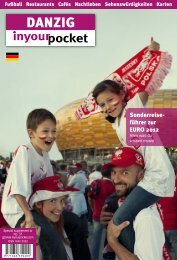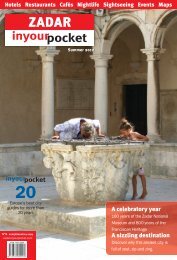7kh 7ul flw\ v prvw dxwkhqwlf 7h[ 0h[ uhvwdxudqw ... - In Your Pocket
7kh 7ul flw\ v prvw dxwkhqwlf 7h[ 0h[ uhvwdxudqw ... - In Your Pocket
7kh 7ul flw\ v prvw dxwkhqwlf 7h[ 0h[ uhvwdxudqw ... - In Your Pocket
Create successful ePaper yourself
Turn your PDF publications into a flip-book with our unique Google optimized e-Paper software.
6 HISTORY OF POLISH FOOTBALL<br />
The idea of establishing a Polish national football association<br />
came only after Poland had itself re-emerged as a<br />
bonafide country at the end of World War I. Although some<br />
clubs had already been established within the partitioned<br />
parts of Poland, it took them two years to meet and create<br />
what is now known as the PZPN (Polish FA) at the end of<br />
1920. The first championship was won by Cracovia, from<br />
Krakow, in 1921.<br />
The Polish side’s first international came on December<br />
18, 1921. Due to the complicated political situation of<br />
the time, only several countries could be approached for<br />
a match, most of whom turned the opportunity down. With<br />
the selection process taking shape, thirteen players took<br />
the 36-hour trip to Hungary to play there. The subsequent<br />
narrow defeat was regarded as a good result - after all,<br />
Poland was yet to join FIFA and Hungary were playing their<br />
80th international match.<br />
Despite an impressive appearance at the Olympics in<br />
1936 (fourth place), the first important tournament for<br />
Poland was the 1938 World Cup in France. Fate was not<br />
on Poland’s side, as the draw put them up against the<br />
mighty Brazil and even today this match is still regarded<br />
as a classic. The first half was all Brazil as the Canarinhos,<br />
led by the legendary Leonidas, took a 3-1 lead into<br />
half-time. But the second half was time for the Ernest<br />
Wilimowski show as he scored three times to earn his team<br />
a draw and extra-time. As legend goes, Leonidas played<br />
bare-footed in extra time and completed his hat-trick<br />
with two fine strikes, cancelling out a fourth Wilimowski<br />
goal. Wilimowski’s legacy is still much debated in Poland<br />
despite his record of 10 goals in a game still being a Polish<br />
league record. As a Silesian and native German (like<br />
Podolski and Klose in modern day football), Wilimowski<br />
went onto represent Germany before finishing his career<br />
and settling there after the war.<br />
It took a while for the national team to settle after the disastrous<br />
effects of the Second World War, yet by the late fifties,<br />
several new stars were born that would lead the team into<br />
the next few decades including names such as Ernest Pohl,<br />
Gerard Cieślik and Lucjan Brychczy. It took a further ten years,<br />
however, and the appointment of coach Kazimierz Górski in<br />
1970 to make Poland a stronger team. Only eighteen months<br />
into the job Górski had led his side to the gold medal at the<br />
1972 Olympics in Munich, with Kazimierz Deyna (later of<br />
Manchester City) scoring twice in an exciting 2-1 win over<br />
Hungary in the final.<br />
Jan Tomaszewski’s memorable night at Wembley in 1973<br />
© PAP EPA<br />
Just a year later, one of the most famous matches in Poland’s<br />
history was played at Wembley. After a heroic performance<br />
from goalkeeper Jan Tomaszewski - nicknamed ‘the clown’<br />
by Brian Clough - a one-all draw was enough to earn Górski’s<br />
side a place at the 1974 World Cup finals. Impressive performances<br />
in Germany, including defeats of Argentina and Italy<br />
and a 7-0 thumping of Haiti in the group stage, saw Poland up<br />
against the West German hosts in the semi-final. The match<br />
was played in horrible conditions on a water-logged pitch<br />
(many Polish fans will still claim the Germans watered the<br />
pitch despite heavy rain to nullify the Poles’ passing game)<br />
with the only goal of the game coming from Gerd Muller. <strong>In</strong><br />
the match for third-place Poland were better than Brazil and<br />
Grzegorz Lato, current president of the Polish FA, scored his<br />
seventh goal of the tournament winning the Golden Boot in<br />
the process (incidentally beating his strike partner Andrzej<br />
Szarmach, whose tally stood at 6).<br />
After winning the silver medal at the 1976 Olympics, qualification<br />
for the 1978 World Cup quickly followed. An impressive<br />
start put Jacek Gmoch’s squad through to the second round,<br />
but a win over Peru was not enough following defeats to<br />
Argentina (0-2, with Deyna missing a penalty) and Brazil (1-2).<br />
A new head-coach, Antoni Piechniczek, was brought in during<br />
1981 to try to unite an unsettled camp but as he took<br />
over the team, Martial Law was introduced in Poland hitting<br />
his team’s preparations for the 1982 World Cup. With only<br />
domestic players available, Poland started with two goalless<br />
draws but then a 5-1 win over Peru saw them advance. <strong>In</strong><br />
the next round, a fantastic performance from hat-trick hero<br />
Zbigniew Boniek gave Poland a 3-0 win over Belgium, while<br />
a solid 0-0 draw with the Soviet Union won them another<br />
semi-final place. Crucially denied the skills of the suspended<br />
Boniek, Poland suffered a 0-2 defeat to eventual winners<br />
Italy, yet an exciting 3-2 win over France in the third-place<br />
game was still regarded as a huge success back in Poland.<br />
Poland missed out on qualification for the 1984 European<br />
Championships, while the most important legacy of a disappointing<br />
performance in the 1986 World Cup - where an<br />
early exit was confirmed after a Gary Linekar inspired 0-3<br />
defeat to England - was ‘Boniek’s curse’. The then Roma<br />
striker concluded that Poles wouldn’t see their team again<br />
at a major tournament for sixteen years.<br />
Boniek was right. The 1990s witnessed the waste of a wonderful<br />
young team - silver medallists at the 1992 Olympics in<br />
Barcelona. With the domestic game sinking deeper into corruption,<br />
fans watched the disappearance of Polish clubs from<br />
the group stage of the Champions League (Widzew Łódź were<br />
the last, in 1996). Boniek’s curse ended when Jerzy Engel’s<br />
team were the first European team to qualify for the 2002<br />
World Cup, but disastrous performances against Korea (0-2)<br />
and Portugal (0-4) meant it was a short trip. Similarly poor<br />
performances meant that Poland failed to advance beyond<br />
the group stage at the 2006 World Cup finals in Germany.<br />
The Polish FA then decided that it was time to give a foreign<br />
coach a chance.<br />
Dutchman Leo Beenhakker took on the role and he inspired<br />
the team during Euro 2008 qualification, winning 2-1 in<br />
style against Portugal thanks to Ebi Smolarek’s brace.<br />
Unfortunately, while Poland yet again had enough class to<br />
qualify for the finals they could not advance from their group<br />
once at the tournament. However, failure in qualification for<br />
the 2010 World Cup saw the Dutchman unceremoniously<br />
sacked live on TV, a few minutes after the 0-3 away defeat<br />
to Slovenia, during an interview with the Polish FA president,<br />
Grzegorz Lato.<br />
Gdańsk <strong>In</strong> <strong>Your</strong> <strong>Pocket</strong> gdansk.inyourpocket.com<br />
The Irish Football Team<br />
are staying in Sopot<br />
and You?<br />
check it out on www.sopot.pl
















